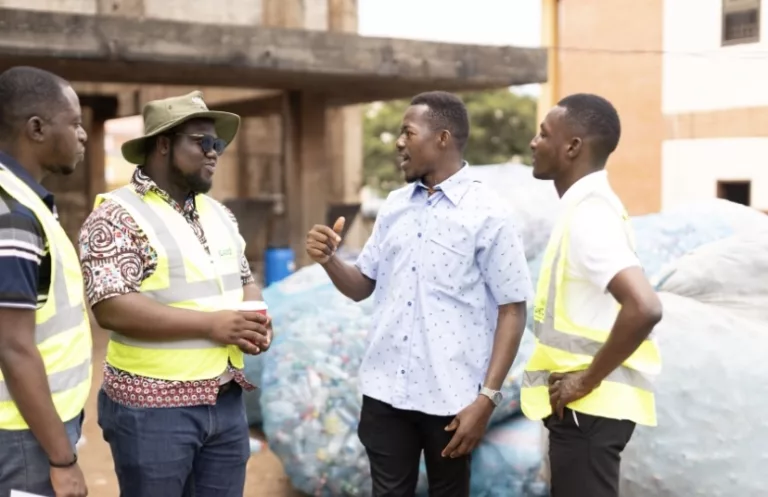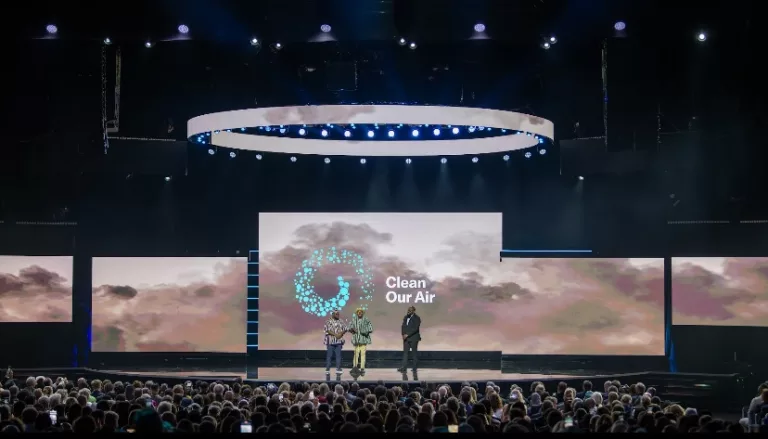I grew up in a village in northern Ghana, where I helped my dad farm. We composted organic waste with cow dung instead of throwing it away. When I moved to Cape Coast to study for my first degree, a bachelor’s in environmental science, I’d never experienced that kind of city life before and expected something upmarket and beautiful.
It was neither. Fishermen left plastic and textile waste on the shore, and communities dropped their waste into the drainage when it rained, thinking it would wash out to sea. Waste collection is insufficient in this country, so people have had to find other ways to dispose of theirs.
The climate crisis is severely harming Ghana. That rubbish is carried upstream, choking rivers in the south and exacerbating severe flooding during heavy rainfall, decimating entire communities, for example, when the Volta River burst its banks in 2023 displacing around 36 000 people.
At Agbogbloshie, Accra, Ghana’s largest informal electronic waste processing and recycling site (since demolished), people dumped anything, often hazardous waste and pollutants, to be burned. The site was next to a market where traders sold food, and they and their customers inhaled the fumes.
When I was at university, my friend’s elder brother worked at Agbogbloshie, salvaging scraps, whatever he could find to sell. We didn’t hear from him for two weeks, only to discover he’d died from stepping on a fluid that irritated his skin, poisoned his blood and destroyed his organs.
In general, modern society is accustomed to change and convenience, such as single-use plastics and fast fashion, instead of reusing what we have, and we’ve forgotten how to separate waste.
Co-founder of Green Africa Youth Organization (GAYO) in Ghana, Desmond Alugnoa.
So, I co-founded an organisation we would later call the Green Africa Youth Organization (GAYO) in 2015 with my university friend Joshua Amponsem as a youth-led initiative to deliver practical climate solutions for communities. Three university lecturers from the University of Cape Coast, who recognised how determined we were as young people to mobilise our colleagues to affect change, contributed towards registering our organisation.
ALSO READ: SA wildlife filmmaker scoops award for African vultures documentary
We began with beach clean-ups and then taught fishermen not to throw rubbish by the shoreline where it would enter the sea and cause pollution, encouraging them to join our beach clean-ups. They helped us understand our education would equally benefit wider communities.
We taught locals how their actions harm the environment and to adopt a zero-waste lifestyle to reduce their carbon footprint by rethinking how they bought, consumed and disposed of waste to ensure it could be recovered, reused, recycled or composted. Practices included separating their rubbish and using paper cups instead of plastic ones.

Only the infrastructure didn’t support those new habits, as municipalities transported their carefully sorted waste to dumps and landfills to deposit in the same place regardless of what it was. Our message was redundant.
Changing tack, I moved to New Edubiase, a small town in Ghana’s Ashanti Region, to pilot a Zero Waste Management Model, since replicated in communities in Cape Coast, Kumasi and Accra.
We’d already been educating children about disaster risk reduction (DRR) and organised a quiz competition among four senior high schools in Ghana. Those who were separating their waste at home brought sacks to school containing different types of rubbish, mainly food and plastics.
We had a composting pit at the school and waste bins for collecting plastics. We made compost to use on the land the school donated to cultivate maize and cassava – which I called our demonstration farm – and divided the produce into three parts: for replanting, selling to buy school supplies, and replicating the project at another school.
We recycled plastics into raincoats, shower curtains, pencil cases and school bags, organised a sustainable fashion day, bought young girls who’d dropped out of school sewing machines and taught them how to make the products, and a friend, a Ghanaian living in Sydney, Australia, who owns a sustainable clothing label, bought our products, as did The Shop Accra, which connects local arts and crafts brands to consumers.
Expanding our efforts to the broader community, we offered incentives to separate at source, such as providing households and other waste producers with bins for different waste types. GAYO built buy-back centres where waste collectors and pickers, whose activities range from waste collection to sorting, recycling and recovery, would be paid fairly for the recyclable waste they collected, which the centres then sold to industries that would use the raw materials to make new products.
GAYO’s key staff are aged 35 and below. Our African Climate Change Innovation Challenge, a competition for young Africans to create a sustainable impact in their communities, supported 10 continent-wide solutions with up to $70 000.

Meeting Prince William in Kirstenbosch National Botanical Garden during the week of the Earthshot Awards, he showed a genuine interest in our work, asking specific questions, like how we supported many communities and avoided air pollution. We’ll use the prize money to expand our model to other places in Ghana, Botswana and Uganda.
This article was written by Lisa Abdellah for Getaway’s January 2025 print edition. Find us on shelves for more!
(Pictures: Courtesy Images)
Follow us on social media for more travel news, inspiration, and guides. You can also tag us to be featured.
TikTok | Instagram | Facebook | Twitter
ALSO READ: South Africa’s succulent smuggling crisis worsens

